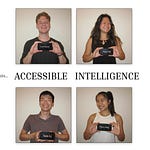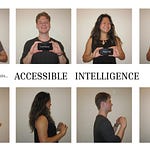4-7.21.24
Hi everyone,
I just came back from China after securing a full-time job. I primarily visited family in Foshan (a city in the Guangdong province in Southern China) but also had the chance to visit other cities in the province, including Guangzhou and Shenzhen.
As anyone who has been to Asia can probably relate to, it’s a lot of feelings and experiences at once that are hard to fully describe. Therefore, I have decided to split up this week’s edition of the newsletter into three parts to better articulate the experience. Each part will have a theme which is as follows:
1. Family → “Navigating Emotions: Rediscovering Family Ties on My Return to China”
2. Technology → “Modern Marvels: Tech Transformations in China”
3. Identity → “Balancing Dual Identities: The Chinese American Experience”
Notion Tips and Templates:
Notion Tip: Use Linked Databases for Better Organization: Instead of managing multiple databases separately, link them together. This allows you to view and update information across different databases in one place, keeping your workspace organized and efficient. For example, link your task database with your project database to see all relevant tasks and their statuses in a single view.
Featured Notion Template: contact list
A contact list is for important contacts such as professors, classmates, and advisors. It’s crucial for staying connected and having all necessary information at hand.
Here is Part 1 of 3: “Family → ‘Navigating Emotions: Rediscovering Family Ties on My Return to China’”
Visiting Extended Family
Visiting extended family in a country where your primary language isn't spoken is a journey filled with intrigue and unexpected challenges. It’s a blend of excitement and unease, offering rewarding and daunting experiences. Growing up in the U.S., with roots in Ohio, I learned both English and Mandarin Chinese, which kept me connected to my heritage. Yet, my extended family in China, fluent in Cantonese and Mandarin, presents a linguistic puzzle that adds a layer of complexity to our interactions. This enigmatic divide in language complicates communication in the verbal sense but makes nonverbal communication even more meaningful. How do these dynamics shape family connections?
Past Visits to China
I haven’t been back to China in 9 years, since 2015, and honestly, I don’t remember much from that trip. During that visit, I stayed in Foshan for two weeks and spent time with my grandparents in their apartment before going to Hainan to see my dad’s side of the family. Before that, my last visit was in 2012, which feels like a lifetime ago. In 2012, I traveled to Beijing and Shanghai, where I visited the Great Wall. During that earlier trip, I had a chance to see more and experience the culture for a longer period of time, including attending a local festival and trying traditional street foods. However, as time has passed, those memories have also started to fade.
Growing Up Apart
I grew up apart from my extended family since most of them stayed in China while my parents lived in the U.S. My parents moved to the U.S. in the late 1980s for better job opportunities and settled in Ohio. My grandparents visited the U.S. a few times when they were younger, specifically in the early 2000s. But it was when I was very little, around 2 or 3 years old, and I personally don’t remember them coming. They stayed with us, helping my parents take care of me, but those visits became less frequent as they aged and travel became more challenging for them.
Becoming a Stronger Traveler
This time seeing my extended family was different because, even though we mostly speak different languages, I have had many language and travel experiences that have made me a stronger traveler. Specifically, I took five semesters of Chinese at Georgetown University, where I not only learned the language but also gained insights into Chinese culture and history, ultimately becoming proficient enough to graduate (yay!). In the past two years, I traveled to various countries including the Dominican Republic, where I saw the Dominican-Haitian border; India, where I marveled at the Taj Mahal in Agra; South Africa, where I went on a safari; Ireland, where I enjoyed the vibrant city of Dublin; and Ghana, where I visited the historic Cape Coast Castle. These experiences improved my ability to communicate with people from different cultures and taught me how to travel effectively (always have Advil and Dramamine ready!).
Overcoming Fear
The first full day of the China trip, I felt an irrational fear of asking my cousin if we could go somewhere fun, perhaps to explore a new place that I hadn’t seen before. This feeling was hard to shake off in the moment. I vividly recall several other moments during the trip where this sense of hesitation crept in, particularly when I had to use Mandarin. For example, during my hotel stay in Foshan, I wanted to ask the cleaning lady for more towels and tissues but hesitated because I was unsure of my pronunciation. Despite having a reasonably good command of the language and being able to get by in most situations, I still found myself holding back. Below is a moment of exploring in Foshan.
Family's Significance
That feeling makes the actions of my family that much more significant to me. Sometimes, I feel their care and affection through kind and thoughtful words, like when my aunt in Foshan complimented my Chinese speaking abilities me. Other times, it's through considerate and warm gestures, such as my uncle taking me to insanely good restaurants across Foshan, Guangzhou, and Shenzhen. Each expression, whether verbal or physical, reflects their genuine concern and love. Amidst all these varied expressions, the one constant is the care they consistently show. Below is a moment during one dinner where the smoke from the food is intense enough to reach the ceiling.
Reflections on Family Dynamics
I feel incredibly fortunate to have a family like this. I was especially struck by this feeling after reading a New York Times article about a therapy approach that encourages people to cut ties with their family members. While I neither support nor reject this method, I find it difficult to relate to because my family has always been a significant source of support in my life. For example, my parents have always been there for me during challenging times, like when they drove to D.C. to support me during a stressful time at Georgetown. Unlike the experiences described in the article, my family dynamics are positive and nurturing. I am endlessly grateful for the love and support they provide.
Future Visits
It makes me sad and wistful that I can’t visit my extended family more often, but this feeling also fuels my motivation to work hard. I aspire to create opportunities to return, not just during family trips, but independently as well. For instance, I hope to save enough money to visit them every summer. Everyone is growing up and evolving at different stages and paces, making these moments of connection even more precious and significant. My cousin, who was barely in middle school during my last visit, is close to being done with college and figuring out her next steps. These aspirations bring a sense of purpose to my efforts, reminding me of the importance of family ties.
Finding Tranquility
I think some of the best moments have been when we are just silently together, each engrossed in our own activities. For instance, sitting with my grandparents in their living room in Guangzhou, sipping tea and reading a book while they watch TV. These times create a rare sense of tranquility and comfort for me, especially at this stage of my life. As a recent graduate starting to navigate the professional world, these peaceful moments provide a much-needed break from the busyness and stress of this transitional period. It's in these quiet moments that I find solace and a deeper connection with my family, no matter how often or rare we get to see each other.
💡 If you would like to watch the full China trip, I filmed a recap!⬇️
How do you view family dynamics?












